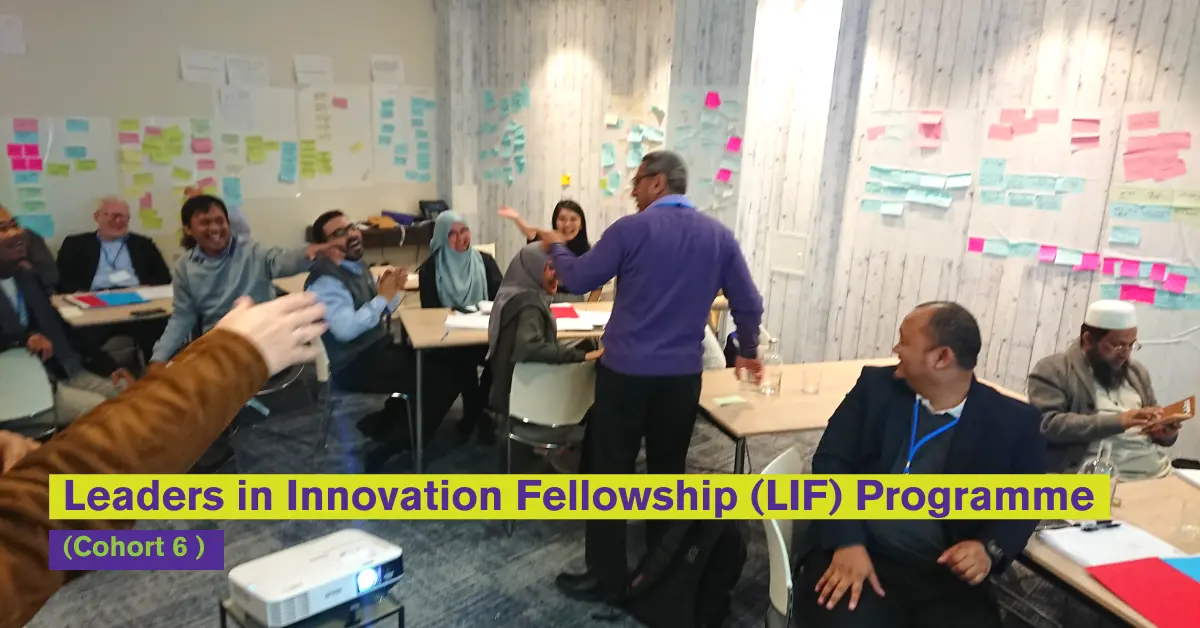
Steve Jobs mentored Mark Zuckerberg, Warren Buffet mentored Bill Gates, Christian Dior mentored Yves Saint Laurent – several successful leaders across different industries have sought the support of mentors at various points during their career, entrepreneurship, and leadership journeys. Their role and importance in professional and personal journeys is not lost on many. For the lucky few, great mentors appear organically and informally in everyday life but when this does not happen, a mentoring component in a structured business programme helps.
However, the idea of intentionally integrating a mentoring component to a structured business programme dedicated to entrepreneurs is relatively new. The Leaders in Innovation Fellowship (LIF) programme implemented by the Royal Academy of Engineering used this approach with the aim of supporting researchers and innovators in the engineering space to commercialise their engineering-based innovations that address one or more of the United Nations Sustainable Development Goals (SDGs).
The Shine Consortium comprising of the University of West of England (UWE Bristol), ChangeSchool and ourselves, Mowgli Mentoring, delivered the sixth cohort of the LIF programme that brought together 55 selected emerging leaders from Newton Fund Countries (Jordan, Egypt, Indonesia and Malaysia) for a 1-year programme designed to build their entrepreneurial capacity through:
Commercialisation training
In country events and activities organised by local partners
Mentoring
Peer networking
Each entrepreneur was paired with a mentor and received training to catapult these engineers on their product commercialisation journey.
At Mowgli Mentoring, we believe that when you mentor the entrepreneur, you invest in the individual behind the business making them even more resilient for the issues and risks that may lie ahead. The programme started with a two-week residential commercialisation training programme in London combined with mentoring matching and initial one-to-one and group mentoring sessions.
When the pandemic hit, countries started introducing restrictions on travel, imports, exports, and overall inter-country movement to minimise the spread of the virus, it had adverse effects on our entrepreneurs’ mentoring relationships and businesses operations in general.
It became obvious that the mentees needed a different kind support to make sense of the COVID-19 situation and its impact. This included examining their new constraints and opportunities, adapting, and responding to these externalities.
Based on that, the mentoring component was heavily shifted toward “COVID survival and adaptation.” It was a critical period for mentors to support fellows with thinking through their professional, personal, and innovation-related responses to the new context. That is where Mentor Training is crucial: not everyone can mentor effectively at any given time and context. Mentoring others demands specific skills like active listening, providing constructive feedback, asking powerful questions, but also empathy, self awareness, whatever context the mentee might be in. Training our mentors, strengthening their mindset, their skills and their toolbox enabled them to support effectively the mentees, even in the heat of the pandemic.
In addition to the planned programme design, Shine’s core team provided additional mentoring materials and resources for fellows and mentors that helped them with orienting to what was now dubbed “the new normal”.
Over the 12-month follow-on period, fellows received a total of 1,456 hours (an average of 26.5 hours per fellow) of tailored mentoring support, including one-to-one mentoring sessions, group mentoring sessions and technical mentoring drop-ins.
Despite the precarious position of these businesses within the entrepreneurial life cycle, many being within the Valley of Death (pre-breakeven stage), our efforts paid off at the end of the line:

*Source: Academy End line survey “How many products and services are you personally developing?” Egypt: 17 products and services developed by 12 fellows, Malaysia 29 products and services developed by 13 fellows, Jordan 51 products and services developed by 12 fellows, Indonesia 123 products and services developed by ten fellows.
But more importantly for mentees, mentoring has strengthened them on 5 fronts:
Competence Development
Performance
Well-being
Learning
Self-confidence
Mentoring positively impacts mentees’ ability to see and understand their development areas.

Mentoring helped mentees to learn about their personal strengths and development areas.
Mentoring positively impacts mentees’ ability to articulate and interpret their thoughts and feelings, reducing stress levels and improving performance.

Mentoring increased their ability to perform effectively in their role in the field.
Mentoring positively impacts mentees’ well-being, the resilience, ability to bounce back and cope with challenges.

Mentoring increased their ability to adapt, bounce back and cope with challenges.
Mentoring positively impacts mentees’ ability to understand context and culture.

Mentoring enabled mentees to broaden their perspectives.
Mentoring positively impacts mentees’ self-esteem, giving a sense of empowerment.

Mentoring increases personal confidence and self-esteem.
Business training is an important aspect of an entrepreneur’s learning journey, ensuring they have up to date knowledge, information, and models for effective entrepreneurship. However, it is “one size fits all” and is not bespoke to the needs of that individual entrepreneurs. It is often based on theory, which can mean that it ends there, and is never put into practice.
Pairing training with mentoring, which is a much more individual and bespoke approach, means that the effect is amplified: mentees can distil which parts of the training are most relevant to them, what they will implement, what fears and internal limiting beliefs may be holding them back from moving forward and have an accountability partner. Mentoring creates a space for deeper analysis and translation of theory into practice.
If you want your beneficiaries to take their business programme learnings’ forward, consider adding mentoring to your offer, not only will the mentors act as sounding boards, cheerleaders, and mirrors, guiding, and encouraging them through their journey but also, your programme will become uniquely tailored to each one of them. If you would like to discuss how mentoring can support your programme and your beneficiaries, don’t hesitate to contact us!